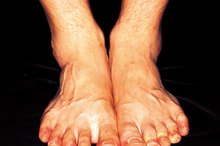Name Different Kinds of Fluid Pills
Diuretics, as defined by Cedars Sinai Medical Center, are medications which reduce the amount of salt or sodium and water in the body 1. They are given for high blood pressure, congestive heart failure, water retention and kidney or liver disease. There are three types of diuretics, including loop-acting, thiazide and potassium-sparing 45. The Mayo Clinic explains that each works by affecting a different part of the kidneys 2.
Loop-Acting Diuretics
CVPharmacology.com describes loop-diuretics as those which act on the thick ascending limb in kidney’s glomerulus, which is near the Loop of Henle which is responsible for concentrating the urine 4. These loop diuretics are very powerful and cause the kidneys to get rid of more urine, lowering the amount of water in the body, according to Cedars Sinai Medical Center 14. Drugs.com states that the most commonly used brand names of loop diuretics in the United States are Bumex, Lasix and Edecrin 45. Most patients in heart failure are prescribed a loop-acting diuretic, because they are more effective in unloading water and sodium than the other kinds. Adverse side effects can include low potassium and magnesium levels, low blood pressure and dehydration.
Thiazide Diuretics
Water Pill Side Effects
Learn More
Thiazides are the most commonly used diuretic, according to CVPharmacology.com. These drugs inhibit the sodium-chloride transporters in the distal tubule in the kidney. Thiazides are the only types of diuretic that widens the blood vessels to lower the blood pressure according to Cedars Sinai Medical Center 1.
The Mayo Clinic cites that a large group of medical experts recommend that most people should try thiazide diuretics as the first choice to treat high blood pressure 12. Among the most commonly used brand names of these drugs in the United States are Diuril, Hydrodiuril, Hydromox, Naqua, Naturetin, Oretic and Zaroxolyn. Some adverse effects can include high cholesterol, low potassium and magnesium levels and high blood sugar levels in diabetics.
- Thiazides are the most commonly used diuretic, according to CVPharmacology.com.
- Thiazides are the only types of diuretic that widens the blood vessels to lower the blood pressure according to Cedars Sinai Medical Center 1.
Potassium-Sparing Diuretics
According to CVPharmacology.com, potassium-sparing diuretics cause more sodium and water to pass into the collecting duct of the kidney’s glomerulus to be excreted in the urine 45. Because they inhibit sodium reabsorption, these diuretics do not produce a low potassium level as the other two kinds; therefore they are often given in conjunction with a thiazide or loop diuretic 45. The most common names of the medications are Aldactone or spironolactone, Dyrenium and Midamor. Adverse effects may include high potassium levels and gastric problems such as ulcers.
Related Articles
References
- Cedars Sinai Medical Center: Diuretics
- Mayo Clinic: Diuretics
- Cardiovascular Pharmacology: Diuretics
- Drugs.com: Loop Diuretics
- Drugs.com: Potassium-Sparing Diuretics
- Duarte JD, Cooper-DeHoff RM. Mechanisms for blood pressure lowering and metabolic effects of thiazide and thiazide-like diuretics. Expert Rev Cardiovasc Ther. 2010;8(6):793–802. doi:10.1586/erc.10.27
- U.S. National Library of Medicine, StatPearls. Thiazide Diuretics. Updated February 4, 2019.
- U.S. National Library of Medicine, StatPearls. Loop Diuretics. Updated October 15, 2019.
- Elsevier ScienceDirect. Hypokalemia: Adjuncts to Therapy. Published 2017.
- American Heart Association. Types of Blood Pressure Medications. Reviewed October 31, 2017.
- National Health Service, UK. Furosemide. Reviewed January 10, 2019.
- Johns Hopkins Lupus Center. Blood Pressure Medications (Anti-hypertensives).
- Leone A. Does Smoking Act as a Friend or Enemy of Blood Pressure? Let Release Pandora's Box. Cardiol Res Pract. 2011;2011:264894. Published 2011 Jan 19. doi:10.4061/2011/264894
- Harvard Health Publishing, Harvard Medical School. Tips for Taking Diuretic Medications. Updated September 25, 2019.
- American Heart Association. Changes You Can Make to Manage High Blood Pressure. Reviewed November 30, 2017.
Resources
Writer Bio
Rhonda Merritt started freelance writing in 2010. She is a registered nurse specializing in cardiac rehabilitation and cardiac care. Merritt has her personal fitness coach certification and is a certified CPR instructor. She holds a Bachelor of Science in nursing. Merritt graduated from Edinboro University in 1988.








